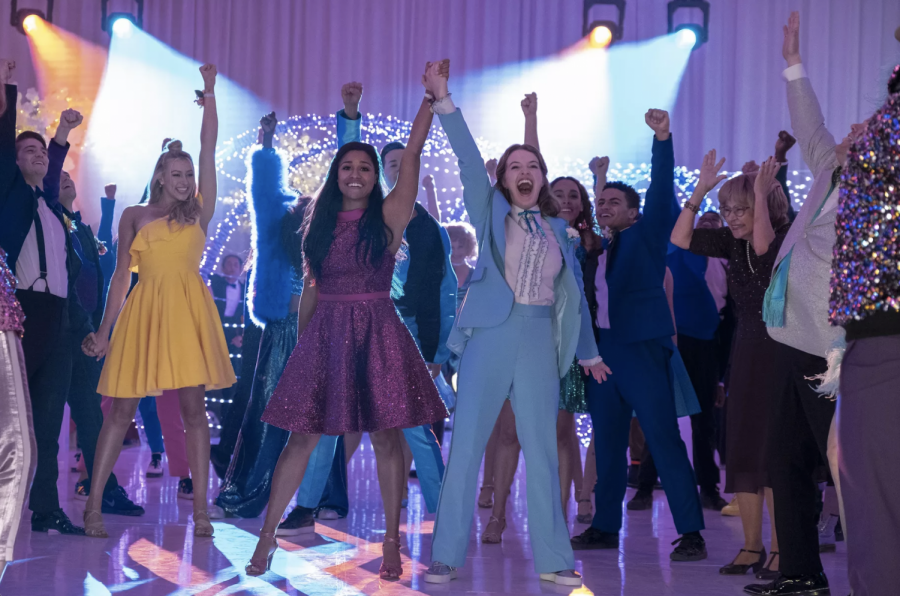‘The Prom’ falls short
Broadway adaptation provides tone deaf and disjointed experience
December 26, 2020
After a slew of mediocre musical movies being released over the last few years, I can’t say I wasn’t excited to watch “The Prom.” Now, after seeing the film two times, I wish I hadn’t.
“The Prom” follows Emma (Jo Ellen Pellman), a teenage lesbian who pressured her schools PTA to allow her to bring her closeted girlfriend Alyssa Greene (Ariana DeBose) to the local Prom, which led to the entire Prom being cancelled. Looking for a way to boost their publicity, four washed up Broadway performers, Dee Dee Allen (Meryl Streep), Barry Glickman (James Corden), Angie Dickenson (Nicole Kidman) and Trent Oliver (Andrew Rannells), travel from New York to Indiana to advocate for Emma.
Although the film sets up an interesting and original story, nothing in the movie ever quite lands. The emotional scenes feel forced, the comedy is either weak or offensive and almost all of the musical numbers are uninspired. With the exception of Rannells’ performance of “Love Thy Neighbor” and DeBose’s “Alyssa Greene,” every song left me with an incomplete feeling. Rannells’ performance gives both comedy and clarity through his musical conversation with Emma’s bullies, as he explains how they themselves don’t follow every rule in the bible and shouldn’t expect Emma to either. Not only does it have an important message, but Rannells brings something special to the song that stands out within a movie that bores. DeBose showcases one of the only convincing emotional moments in the entire film through her performance of “Alyssa Greene.” DeBose’s subtleties and desperation add something fresh and enticing to “The Prom,” something I was forced to wait for until two-thirds into the film.
Although Streep gives an amazing performance as usual, she blends into this ultimately unsuccessful movie. She’s convincing in her role, Dee Dee Allen is an unlikeable character, making it hard to root for her as she holds a large portion of the screen time. However, she displays her talent in a monologue describing the relationship she has with her ex-husband. Streep is a film icon in every sense of the word, and although this is not her best performance, she still added a few moments of comedy and emotions throughout the film.
Following Streep’s monologue, Corden had a similarly emotional scene discussing how his parents planned to send him to conversion therapy when he came out to them. Although I would love to say his performance was engaging and heart wrenching, it felt almost comedic. Outside of that scene, it seems that every trait Corden expresses is rooted in stereotypes. It is almost impossible to talk about Corden’s performance without talking about the fact that he is a straight man in real life. Although I am not always opposed to straight actors playing gay roles, the issues arising from these situations are exemplified through Corden’s role in the movie. From his lisp, to flailing arms, to almost every line he has being a gay joke, his delivery, both physically and verbally, is offensive and distracting, especially alongside the otherwise talented cast.
Outside of the acting, “The Prom” never seemed to establish a distinct tone. As a viewer, I couldn’t keep the emotion of each character or scene straight. It was a constant battle to understand if the leads were feeling inspired or dejected, which made the movie essentially exhausting to watch. There was no connection between scenes, making the whole film disjointed. By the end of the movie, I almost forgot that each of the characters knew each other. So much of the main cast is written to be extremely close, but we are never given a chance to see that, which took me out of the movie on multiple occasions.
Overall, “The Prom” had potential to be a fantastical, moving coming of age LGBTQ+ story, but due to it’s faulty casting and incoherent directing it completely fell short. As a big theater person, I am always glad to see Broadway musicals adapted for screen. Transforming live storytelling into film however has its downsides. “The Prom” was not intended to be a film, and I can’t help but picture how much more I would’ve enjoyed this story if I could’ve seen it on stage.
“The Prom”: ★★☆☆☆




